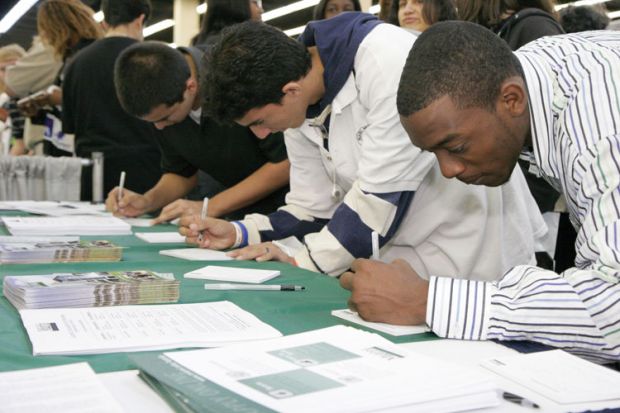Source: Alamy
Numbers game: senior administrator warns over ‘top-down’ recruitment goals
US universities are facing a “crisis of ethics” and risk “selling out the quality of education” as pressure mounts to increase international student numbers, a high-ranking administrator has warned.
Kristin Williams, associate provost for graduate enrolment management at George Washington University, said at a round-table debate that the leaders of US institutions in financial difficulties were imposing arbitrary international student recruitment targets without consultation or proper consideration.
“What I see as the biggest problem in this area is that there is a top- down statement of numbers,” she said. “Managers say: ‘We’re going to bring in 2,000; we are going to do this, or increase that by x per cent.’ There’s never that thoughtful decision about what we are doing, who we are and what we can actually accommodate.”
The debate was organised by World Education Services, a not-for-profit organisation that specialises in evaluating overseas students’ credentials, and was heard at the Association of International Education Administrators annual conference, held in New Orleans last week.
Previewing its report on international student mobility trends, due to be published next month, a document from World Education Services says: “From the supply side, the recent trend toward the purposeful recruitment of international students has been instigated by the global recession and the…decrease in state support for higher education. Many institutions, however, have lacked the internal capacity and preparedness for this sudden shift.
“Our survey results suggest that external pressures are compelling institutions to seek more aggressive, diverse and efficient international enrolment growth.”
The document adds that growing numbers of well-funded international undergraduates present opportunities for universities to meet budget shortfalls, but also pose challenges in terms of effective recruitment. It also advises higher education institutions not to lose sight “of the broader goals of internationalisation which acknowledge the value of diversity in enhancing academic and cultural experiences”.
Dr Williams said: “International student recruitment is no different than any other student recruitment. The focus has to be on the institution and what we offer: our strengths, our weaknesses and our strategic goals in terms of the type and diversity of students we want to attract.”
She criticised the increasing but still highly controversial use of international student recruitment agents by US institutions. She said that if a university’s own recruiter “feels that they cannot do it themselves and…feels that they have to hire somebody, particularly on a commission basis…then you should fire them and find someone who knows their job”.
When approached by recruitment agents, she said institutions should ask: “‘What is it that we need…that we can’t do ourselves? Why should we have you come in and do it when…you are a for-profit who will then make a profit on it?’ I’d rather…keep that money and students save that money.
“The biggest crisis we have today…is one of ethics - the fact that we are selling out our names and…the quality of our education. You can see it every day: top-down decisions that are not really involving the people.”
Register to continue
Why register?
- Registration is free and only takes a moment
- Once registered, you can read 3 articles a month
- Sign up for our newsletter
Subscribe
Or subscribe for unlimited access to:
- Unlimited access to news, views, insights & reviews
- Digital editions
- Digital access to THE’s university and college rankings analysis
Already registered or a current subscriber?
